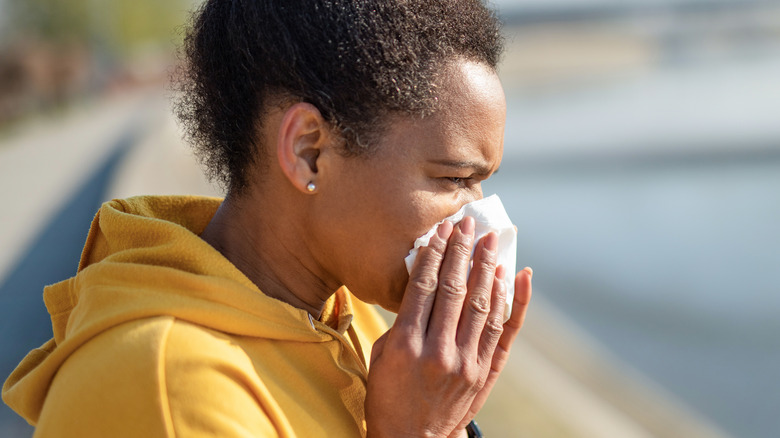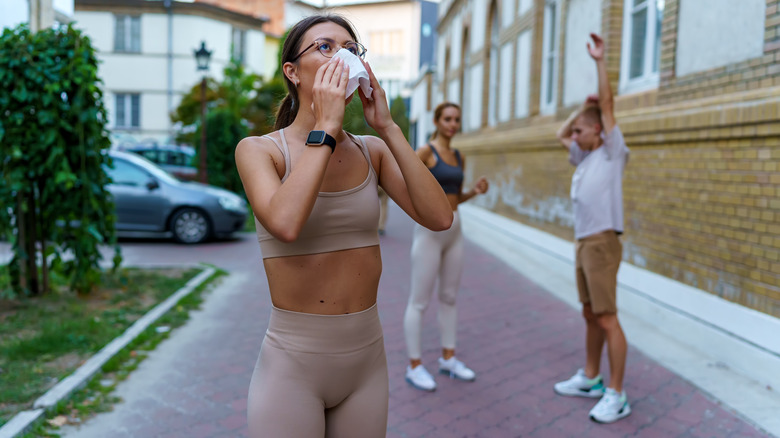What It Means When Exercise Makes You Sneeze
Exercise does a lot for your health. It gets you up and moving from a sedentary lifestyle, for starters. Additionally, frequent exercise has been linked with improved brain health, weight management, stress relief, and bone and muscle strength, per the Centers for Disease Control and Prevention.
But are you one of those people who lets out a big old sneeze (or a few of them) when you start exercising? While that's not one of the pleasant outcomes you're hoping to have through physical activity, exercise-induced sneezing does happen. And there are several reasons why.
For starters, it might be due to a condition called exercise-induced rhinitis (EIR). According to a 2006 study published in the Annals of Allergy, Asthma, and Immunology, exercise-induced rhinitis is more common among people who already have allergies, but this doesn't mean others can't have it (via TODAY). What exactly is EIR, and how can it be prevented?
Exercise-induced rhinitis presents as congestion, nasal itching, and sneezing
A 2018 research paper published in the Annals of Allergy, Asthma, and Immunology called EIR an "elusive disease." According to pulmonologist and sleep doctor Dr. Mayank Shukla, it's important to understand what exactly happens during exercise in order to grasp what EIR is. When you step out for a run or hit the gym for a 30-minute workout, your heart rate increases because it's pumping out more oxygen to meet the requirements of elevated levels of activity. This essentially means that your nose and lungs are working overtime to breathe in more air to supply that oxygen. Taking in as much as 15 times more oxygen can result in you inhaling allergens from the environment that eventually irritate your nasal passage, and this can lead to a runny nose, sneezing, watery eyes, and congestion.
If you're already familiar with allergies, you probably know all about avoiding potential allergens like pollen, smoke, pollution, pet dander, household chemicals, etc. And this is the same principle someone with exercise-induced rhinitis should be following. The condition itself is harmless (via TODAY), but as Dr. William Silvers, lead author of the 2006 study, told the publication, it "snots up your nose and clothes!" Nasal sprays, allergy testing, immunotherapy, and avoiding triggers are all things you can try.
Even without EIR, you can sneeze during a workout
Dr. Neil Kao, an allergy and asthma specialist at the Allergic Disease and Asthma Center in Greenville, South Carolina, told WebMD that sneezing during exercise might also have to do with your nose and mouth drying up during a workout. "You hyperventilate when you're over-exerted, and as a result, your nose and mouth start to dry up," explained the expert. "So your nose reacts by starting to drip, making you sneeze."
Furthermore, working out outdoors where pollen, pollution, and other potential irritants abound and following a fitness routine indoors at the gym or in your home where there might be mold, dust mites, and pet dander can in itself cause you to sneeze (with or without allergies).
Board-certified allergist Dr. Amina Abdeldaim told Livestrong, "When we exercise, the volume of air that moves through our respiratory tract increases. If you are pollen-allergic and choose to exercise outside, you are theoretically exposing your nasal mucosa to more allergen, given that you are moving more pollinated air through the respiratory tract." Another thing to consider, especially when working out outdoors, is photic sneeze reflex (PSR), or sneezing in response to bright light (like sunlight).
When studies show that even 20 minutes of exercise a day can keep a hospital stay away, the solution is not to cut out working out entirely from your life. Again, be mindful of your triggers, find allergen-free spaces, and wear a hat and sunglasses if you're working out outdoors.



